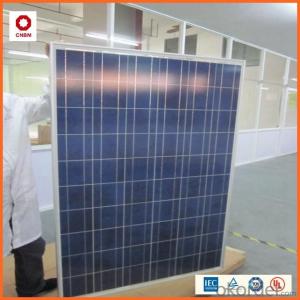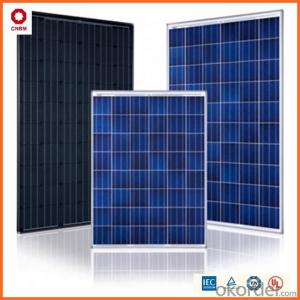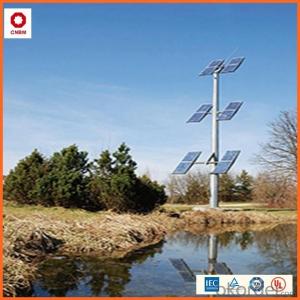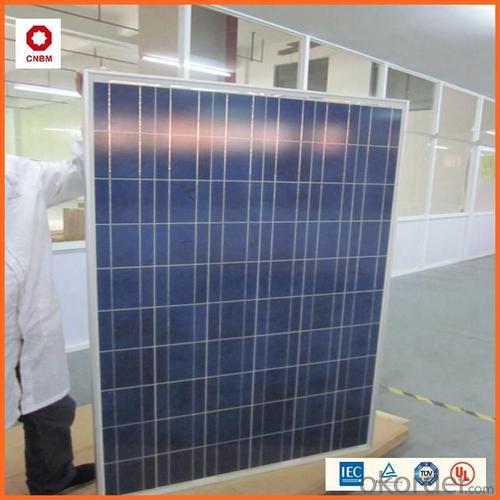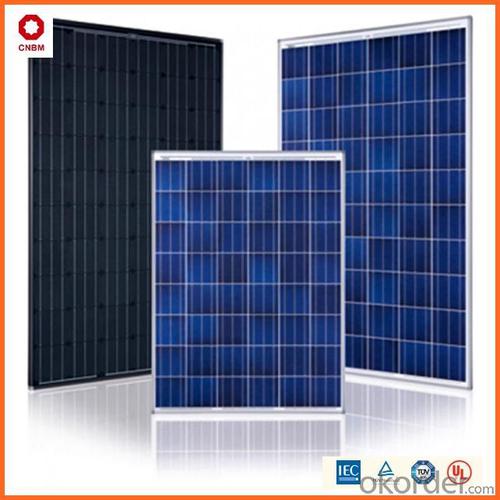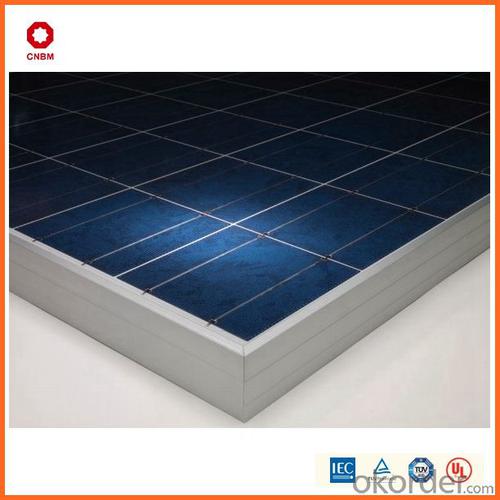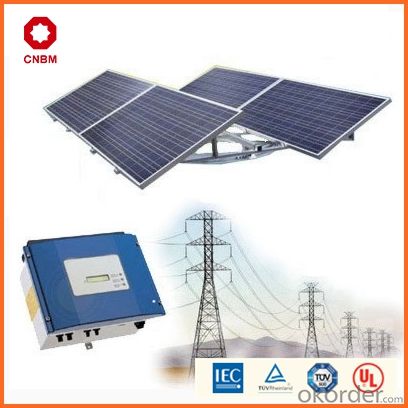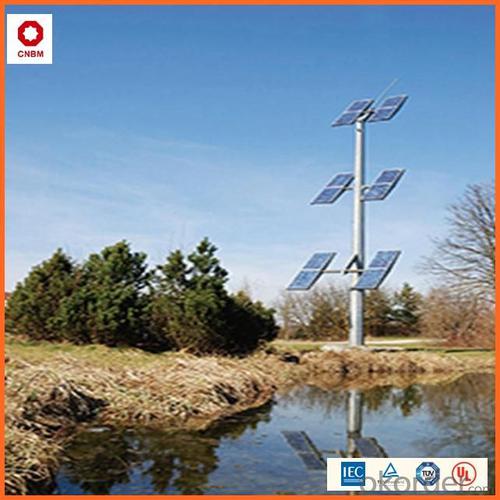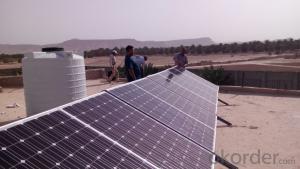Psr Solar Energy Systems 35w Small Solar Panels with Good Quality
- Loading Port:
- China main port
- Payment Terms:
- TT OR LC
- Min Order Qty:
- 1 watt
- Supply Capability:
- 10000000 watt/month
OKorder Service Pledge
OKorder Financial Service
You Might Also Like
Specification
Product Description:
Hot Sale !!! Quality and Safety of Small Poly Solar Panel 25~85w
1. Rigorous quality control meets the highest international standards.
2. High-transmissivity low-iron tempered glass, strong aluminium frame.
3. Using UV-resistant silicon.
4. IS09001/14001/CE/TUV/UL
Warranties of Small Poly Solar Panel 35~85w
1. 10 years limited product warranty
2. 15 years at 90% of the minimal rated power output
3. 25 years at 80% of the minimal rated power output
Specification
Characteristics of Poly solar panels CNBM (25-85W) | |||||
Max Power Voltage Vmp(V) | 30.3 | 30.8 | 31.1 | 31.4 | 31.85 |
Max Power Current Imp(A) | 7.60 | 7.64 | 7.73 | 7.81 | 7.85 |
Open Circuit Voltage Voc(V) | 36.1 | 36.6 | 37 | 37.3 | 37.68 |
Short Circuit Current Isc(A) | 8.50 | 8.55 | 8.65 | 8.75 | 8.85 |
Max Power Pm(W) | 230W | 235W | 240W | 245W | 250W |
Temperature Coefficient of Cells Poly solar panels CNBM (25-85W) | |
NOCT | 45± 2 |
Temperature Coeffucients of Isc | 0.0492 |
Temperature Coeffucients of Voc | -0.3374 |
Temperature Coeffucients of Voc | -0.4677 |
Mechanical Data of Poly solar panels CNBM (25-85W) | |
Dimension | 1638 × 982 × 40 mm |
Weight | 19.5 kg |
No. of Cells and Connections | 60 (6 ×10) |
Tolerance | 0 ~ + 5 W |
Cell | Monocrystalline Cell 156 × 156 mm |
Packing | 624 Pcs/40ft(H) Container |
Limits of Poly solar panels CNBM (25-85W) | |
Operating Temperature | -40 to +85 |
Storage Temperature | -40 to +85 |
Max System Voltage | 1000VDC(IEC) / 600VDC(UL) |
Features of our products:
• High conversion efficiency mono/poly-crystalline amorphous silicon solar cells
• Modules incorporate high performance bypass diodes to minimize the power drop caused by shading
• High transmittance, low-iron tempered glass
• High performance EVA encapsulant to prevent destroying and water.
• AI frame: without screw, corner connection. 8 holes on the frame can be installed easily
• Good performance of preventing from atrocious weather such as wind and hails
• Certifications: CE IEC TUV VDE UL, Class I
• 10 years 90% power output warranty

Shipping of Small Poly Solar Panel 25~85w
By Sea | Delivery from Shanghai or Ningbo seaport |
By Air | Departure from Shanghai Pudong Airport |
By Express | Post by DHL, EMS, UPS, TNT. |
- Q: Can a solar energy system be used in areas prone to hurricanes or tornadoes?
- Yes, solar energy systems can be used in areas prone to hurricanes or tornadoes. However, it is important to ensure proper installation and design to withstand severe weather conditions. This includes using hurricane-rated solar panels, reinforced mounting systems, and secure anchoring. Additionally, regular maintenance and inspections are crucial to identify any damages or issues caused by the extreme weather and ensure the system remains operational.
- Q: What are the components of a solar energy system?
- A solar energy system is composed of several essential elements that collaborate to harness the sun's power and convert it into usable electricity. The primary constituents of a solar energy system are as follows: 1. Solar Panels: These are the most recognizable aspect of a solar energy system. Solar panels, also known as photovoltaic (PV) panels, comprise multiple solar cells that convert sunlight into direct current (DC) electricity. They are typically installed on the roof or ground to capture sunlight. 2. Inverter: The DC electricity generated by the solar panels must be converted into alternating current (AC) electricity, which is the type of electricity used in homes and businesses. An inverter is responsible for this conversion process, ensuring that the electricity can be utilized by various appliances and devices. 3. Mounting System: To securely position solar panels on rooftops or the ground, a mounting system is employed. This system consists of racking or frames that hold the panels in place and allow for optimal sunlight exposure. Additionally, the mounting system ensures that the panels are installed at the correct angle and orientation to maximize energy production. 4. Electrical Wiring: Proper electrical wiring is crucial for connecting the solar panels, inverter, and other components of the solar energy system. The wiring carries the electricity from the panels to the inverter and then to the building's electrical panel, where it can be distributed and used. 5. Batteries (Optional): In certain solar energy systems, batteries are included to store surplus electricity generated during the day for use during the night or periods of low sunlight. These batteries store the excess energy and release it when needed, enabling a more consistent and reliable power supply. 6. Monitoring System: Many solar energy systems are equipped with a monitoring system that enables users to track the performance and energy production of their system. Real-time data on energy generation, consumption, and savings can be accessed through a web-based platform or a smartphone app. 7. Grid Connection (Optional): Solar energy systems can be connected to the electrical grid, enabling excess electricity to be fed back into the grid when the system produces more energy than is being used. This process, known as net metering, allows homeowners to earn credits or receive compensation for the excess energy they generate. In conclusion, a solar energy system is a sophisticated and interconnected collection of components that collaborate to harness the sun's energy and convert it into usable electricity for various applications. These components enable individuals and businesses to reduce their reliance on traditional fossil fuel-based energy sources and contribute to a cleaner and more sustainable future.
- Q: How does the angle of a solar panel affect its performance in different seasons?
- The performance of a solar panel in different seasons is greatly influenced by its angle. Also known as the tilt or inclination, the angle refers to the position of the solar panel in relation to the ground. Typically, the ideal angle for a solar panel varies depending on the location and time of year. In regions closer to the equator, where the sun is directly overhead all year round, the optimal angle is usually close to 0 degrees (horizontal) or a slight tilt towards the equator. During the summer solstice, when the sun is at its highest point in the sky, a solar panel with the right tilt angle will receive maximum sunlight and perform at its best. This is because the sun's rays are more perpendicular to the panel's surface, resulting in greater absorption of solar energy. On the other hand, during the winter solstice, the sun is at a lower angle in the sky, causing less direct sunlight. In this situation, a solar panel with a steeper tilt angle can capture more sunlight by aligning itself more closely with the sun's rays. By adjusting the angle to be more vertical, the panel can maximize its exposure to sunlight and maintain a higher level of performance. In regions with distinct seasonal changes, it can be advantageous to use an adjustable mounting system that allows for the optimization of the solar panel's angle throughout the year. This allows the panel to be tilted towards the ideal angle for each season, resulting in consistent and efficient energy generation. However, it's essential to consider that the angle is just one of many factors that affect the performance of a solar panel. Other factors, such as weather conditions, shading, and the efficiency of the solar cells, also play a significant role. Therefore, when designing an effective solar power system, the angle should be taken into account alongside these other parameters.
- Q: Can solar energy systems be used in conjunction with energy storage systems?
- Yes, solar energy systems can be effectively used in conjunction with energy storage systems. Solar energy systems generate electricity during daylight hours, and any excess energy generated can be stored in energy storage systems such as batteries. These batteries can then be used to power homes or businesses during periods when solar energy generation is limited, such as at night or during cloudy weather. This combination of solar energy systems and energy storage systems allows for a more consistent and reliable supply of electricity, reducing dependence on the grid and promoting greater sustainability.
- Q: Can solar energy systems be used in powering veterinary clinics or animal shelters?
- Yes, solar energy systems can definitely be used to power veterinary clinics or animal shelters. Solar panels can be installed on the roofs or in open areas surrounding these facilities to harness sunlight and convert it into electricity. This renewable energy source can be utilized to power various electrical equipment, lighting, heating, cooling, and other necessary systems, reducing reliance on traditional energy sources and lowering carbon emissions. Additionally, solar energy systems can provide a reliable and sustainable power supply, especially in remote or off-grid locations.
- Q: What is the average cost of a solar panel system?
- The average cost of a solar panel system can vary depending on various factors such as the size of the system, the type and quality of the panels, installation costs, and any additional equipment needed. On average, a typical residential solar panel system can cost between $15,000 to $25,000 before any potential government incentives or rebates. However, it is important to note that the cost of solar panels has been decreasing over the years due to advancements in technology and increased competition in the market. Additionally, the long-term benefits of solar energy in terms of reduced electricity bills and environmental sustainability often outweigh the initial investment cost. It is recommended to consult with a solar panel installation company to get a more accurate estimate based on your specific needs and location.
- Q: How does the size of solar panels impact energy production?
- Energy production is directly affected by the size of solar panels, as it dictates the quantity of sunlight that can be captured and transformed into electricity. Solar panels of larger dimensions possess a greater surface area, enabling them to absorb a larger amount of sunlight and generate a higher electricity output. Consequently, larger panels have the capability to produce more energy in comparison to smaller ones. Moreover, larger panels can accommodate a greater number of solar cells, thereby further augmenting their energy production capacity. Nevertheless, it is crucial to consider the available space, cost, and specific energy requirements when determining the appropriate size of solar panels.
- Q: Can solar energy systems be used for powering airports or transportation hubs?
- Yes, solar energy systems can be used for powering airports or transportation hubs. In fact, many airports and transportation hubs around the world have already implemented solar power systems to meet their energy needs. Solar panels can be installed on rooftops, carports, or open areas within these facilities to generate clean and renewable energy. By harnessing the power of the sun, these systems can help reduce carbon emissions and dependency on fossil fuels while providing a reliable source of electricity for various operations at airports and transportation hubs.
- Q: Can a solar energy system be installed in areas with low sunlight?
- Solar energy systems can indeed be installed in areas with limited sunlight. Despite the fact that solar panels rely on sunlight for electricity generation, technological advancements have enabled solar systems to still produce energy even in regions with low sunlight. In areas with limited sunlight, solar panels are capable of capturing and converting available sunlight into usable energy. Moreover, certain solar systems are designed to optimize energy production by utilizing tracking systems that enable the panels to track the sun's movement throughout the day, thus maximizing the amount of sunlight they receive. Additionally, energy storage solutions like batteries can be integrated into the solar system, allowing for the storage of excess energy produced during periods of higher sunlight for use during periods of lower sunlight. These advancements in solar technology have made it possible to install solar energy systems in areas with low sunlight, thereby offering clean and renewable energy alternatives to a broader range of regions.
- Q: Can solar energy systems be installed on all types of roofs?
- Yes, solar energy systems can be installed on all types of roofs, including flat roofs, sloped roofs, metal roofs, tile roofs, and shingle roofs. However, the design and installation process may vary depending on the specific roof type.
Send your message to us
Psr Solar Energy Systems 35w Small Solar Panels with Good Quality
- Loading Port:
- China main port
- Payment Terms:
- TT OR LC
- Min Order Qty:
- 1 watt
- Supply Capability:
- 10000000 watt/month
OKorder Service Pledge
OKorder Financial Service
Similar products
Hot products
Hot Searches
Related keywords
